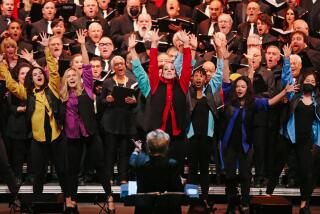Music : A Cappella Group Sings in Beverly Hills
- Share via
Chauntecleer is the perky rooster that livens up Chaucer’s “Canterbury Tales.” Chanticleer, the all-male a cappella ensemble from San Francisco, makes no raucous sounds like its strident, bawdy namesake, but it alerts and captures the ear nonetheless.
Heard in a Christmas concert Friday at All Saints’ Episcopal Church in Beverly Hills, the 12-member ensemble offered a varied program of Renaissance and traditional music, at times moving from one area of the resonant, unadorned church to another or reconfiguring into various combinations to enhance antiphonal or contrasting ensemble effects.
Although the concert was the 15th this month for the ensemble--formed in 1978 by Louis Botto and conducted here by countertenor-music director Joseph Jennings--the singers never sounded tired nor addressed the texts in anything but a fresh fashion.
Throughout, the Chanticleer sound was rounded, full, pure and even from top to bottom and was presented authoritatively in a number of styles that suggested that the male a cappella repertory may be virtually unlimited.
Consider the austere, slow-moving planes of sound in Thomas Stoltzer’s “O admirabile commercium,” sung here with wondrous clarity. Or the blossoming lines of Jean Mouton’s “Ave Maria . . . Virgo Serena,” unfolded with a sense of ease in loosening time’s bonds. Or the grating, strange wanderings into bright tonal areas that suddenly shade over in Giovanni Gabrieli’s “O magnum mysterium,” explored by the singers with an aura of expectant discovery.
The group knew how to vary pacing and style, however, so that the program did not become over-rarefied. They explored the rich folk literature with such works as a group of anonymous Spanish songs from the 14th to 16th centuries, beginning with a trio of tenors in the haunting, wailing lines of “O virgo splendens” and ending with the full ensemble in the earthy and vigorous “Riu, riu, chiu.”
For all that, the most overtly emotional peak of the program occurred with Franz Biebl’s “Ave Maria,” sung from the balcony at the back of the church.
While the 20th-Century composer apparently earns no entry in the standard reference texts, Biebl has written a touching hymn to the Virgin that ends with a hushed hope for consolation at death. This final prayer was intoned by the singers with limpid modesty and deeply felt commitment, and respectful silence lingered after the close.
The program ended in an upbeat mood, however, with a series of traditional favorites, such as “I saw three ships” and “O Holy Night,” and a medley of spirituals, including “Go tell it on the mountain,” arranged by Jennings.
More to Read
The biggest entertainment stories
Get our big stories about Hollywood, film, television, music, arts, culture and more right in your inbox as soon as they publish.
You may occasionally receive promotional content from the Los Angeles Times.










